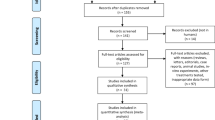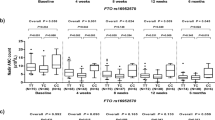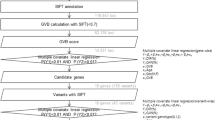Abstract
The aim of the study was to validate the impact of the single-nucleotide polymorphism rs2413739 (T > C) in the PACSIN2 gene on thiopurines pharmacological parameters and clinical response in an Italian cohort of pediatric patients with acute lymphoblastic leukemia (ALL) and inflammatory bowel disease (IBD). In ALL, PACSIN2 rs2413739 T allele was associated with a significant reduction of TPMT activity in erythrocytes (p = 0.0094, linear mixed-effect model, multivariate analysis considering TPMT genotype) and increased severe gastrointestinal toxicity during consolidation therapy (p = 0.049). A similar trend was present also for severe hematological toxicity during maintenance. In IBD, no significant effect of rs2413739 could be found on TPMT activity, however azathioprine effectiveness was reduced in patients carrying the T allele (linear mixed effect, p = 0.0058). In PBMC from healthy donors, a positive correlation between PACSIN2 and TPMT protein concentration could be detected (linear mixed effect, p = 0.045). These results support the role of PACSIN2 polymorphism on TPMT activity and mercaptopurine adverse effects in patients with ALL. Further evidence on PBMC and pediatric patients with IBD supports an association between PACSIN2 variants, TPMT activity, and thiopurines effects, even if more studies are needed since some of these effects may be tissue specific.
This is a preview of subscription content, access via your institution
Access options
Subscribe to this journal
Receive 6 print issues and online access
$259.00 per year
only $43.17 per issue
Buy this article
- Purchase on Springer Link
- Instant access to full article PDF
Prices may be subject to local taxes which are calculated during checkout



Similar content being viewed by others
References
Cara CJ, Pena AS, Sans M, Rodrigo L, Guerrero-Esteo M, Hinojosa J, et al. Reviewing the mechanism of action of thiopurine drugs: towards a new paradigm in clinical practice. Med Sci Monit. 2004;10:RA247–254.
Dubinsky MC, Lamothe S, Yang HY, Targan SR, Sinnett D, Théorêt Y, et al. Pharmacogenomics and metabolite measurement for 6-mercaptopurine therapy in inflammatory bowel disease. Gastroenterology. 2000;118:705–13.
Stocco G, Cheok MH, Crews KR, Dervieux T, French D, Pei D, et al. Genetic polymorphism of inosine triphosphate pyrophosphatase is a determinant of mercaptopurine metabolism and toxicity during treatment for acute lymphoblastic leukemia. Clin Pharm Ther. 2009;85:164–72.
Adam de Beaumais T, Fakhoury M, Medard Y, Azougagh S, Zhang D, Yakouben K, et al. Determinants of mercaptopurine toxicity in paediatric acute lymphoblastic leukemia maintenance therapy. Br J Clin Pharm. 2011;71:575–84.
Schaeffeler E, Fischer C, Brockmeier D, Wernet D, Moerike K, Eichelbaum M, et al. Comprehensive analysis of thiopurine S-methyltransferase phenotype-genotype correlation in a large population of German-Caucasians and identification of novel TPMT variants. Pharmacogenetics. 2004;14:407–17.
Ameyaw MM, Collie-Duguid ES, Powrie RH, Ofori-Adjei D, McLeod HL. Thiopurine methyltransferase alleles in British and Ghanaian populations. Hum Mol Genet. 1999;8:367–70.
Spire-Vayron de la Moureyre C, Debuysere H, Mastain B, Vinner E, Marez D, Lo Guidice JM, et al. Genotypic and phenotypic analysis of the polymorphic thiopurine S-methyltransferase gene (TPMT) in a European population. Br J Pharm. 1998;125:879–87.
Franca R, Rebora P, Bertorello N, Fagioli F, Conter V, Biondi A, et al. Pharmacogenetics and induction/consolidation therapy toxicities in acute lymphoblastic leukemia patients treated with AIEOP-BFM ALL 2000 protocol. Pharmacogenomics J. 2017;17:4–10.
Yates CR, Krynetski EY, Loennechen T, Fessing MY, Tai HL, Pui CH, et al. Molecular diagnosis of thiopurine S-methyltransferase deficiency: genetic basis for azathioprine and mercaptopurine intolerance. Ann Intern Med. 1997;126:608–14.
Relling MV, Gardner EE, Sandborn WJ, Schmiegelow K, Pui CH, Yee SW. Clinical Pharmacogenetics Implementation Consortium, et al. Clinical Pharmacogenetics Implementation Consortium guidelines for thiopurine methyltransferase genotype and thiopurine dosing: 2013 update. Clin Pharm Ther. 2013;93:324–5.
Whirl-Carrillo M, McDonagh EM, Hebert JM, Gong L, Sangkuhl K, Thorn CF, et al. Pharmacogenomics knowledge for personalized medicine. Clin Pharm Ther. 2012;92:414–7.
Relling MV, Gardner EE, Sandborn WJ, Schmiegelow K, Pui CH, Yee SW. Clinical Pharmacogenetics Implementation Consortium, et al. Clinical Pharmacogenetics Implementation Consortium guidelines for thiopurine methyltransferase genotype and thiopurine dosing. Clin Pharm Ther. 2011;89:387–91.
Turner D, Carle A, Steiner SJ, Margolis PA, Colletti RB, Russell RK, et al. Quality items required for running a paediatric inflammatory bowel disease centre: an ECCO paper. J Crohns Colitis. 2017;11:981–7.
Stocco G, Yang W, Crews KR, Thierfelder WE, Decorti G, Londero M, et al. PACSIN2 polymorphism influences TPMT activity and mercaptopurine-related gastrointestinal toxicity. Hum Mol Genet. 2012;21:4793–804.
Liu S, Xiong X, Zhao X, Yang X, Wang H. F-BAR family proteins, emerging regulators for cell membrane dynamic changes-from structure to human diseases. J Hematol Oncol. 2015;8:47.
Quan A, Robinson PJ. Syndapin-a membrane remodelling and endocytic F-BAR protein. FEBS J. 2013;280:5198–212.
Senju Y, Itoh Y, Takano K, Hamada S, Suetsugu S. Essential role of PACSIN2/syndapin-II in caveolae membrane sculpting. J Cell Sci. 2011;124:2032–40.
Senju Y, Suetsugu S. Possible regulation of caveolar endocytosis and flattening by phosphorylation of F-BAR domain protein PACSIN2/Syndapin II. Bioarchitecture. 2015;5:70–77.
Kostan J, Salzer U, Orlova A, Törö I, Hodnik V, Senju Y, et al. Direct interaction of actin filaments with F-BAR protein pacsin2. EMBO Rep. 2014;15:1154–62.
de Kreuk BJ, Nethe M, Fernandez-Borja M, Anthony EC, Hensbergen PJ, Deelder AM, et al. The F-BAR domain protein PACSIN2 associates with Rac1 and regulates cell spreading and migration. J Cell Sci. 2011;124:2375–88.
Chouchana L, Fernández-Ramos AA, Dumont F, Marchetti C, Ceballos-Picot I, Beaune P, et al. Molecular insight into thiopurine resistance: transcriptomic signature in lymphoblastoid cell lines. Genome Med. 2015;7:37.
Seinen ML, van Nieuw Amerongen GP, de Boer NK, Mulder CJ, van Bezu J, van Bodegraven AA, et al. Rac1 as a potential pharmacodynamic biomarker for thiopurine therapy in inflammatory bowel disease. Ther Drug Monit. 2016;38:621–7.
Dervieux T, Boulieu R. Simultaneous determination of 6-thioguanine and methyl 6-mercaptopurine nucleotides of azathioprine in red blood cells by HPLC. Clin Chem. 1998;44:551–5.
Anglicheau D, Sanquer S, Loriot MA, Beaune P, Thervet E. Thiopurine methyltransferase activity: new conditions for reversed-phase high-performance liquid chromatographic assay without extraction and genotypic-phenotypic correlation. J Chromatogr B Anal Technol Biomed Life Sci. 2002;773:119–27.
Paugh SW, Bonten EJ, Savic D, Ramsey LB, Thierfelder WE, Gurung P, et al. NALP3 inflammasome upregulation and CASP1 cleavage of the glucocorticoid receptor cause glucocorticoid resistance in leukemia cells. Nat Genet. 2015;47:607–14.
Hyams JS, Ferry GD, Mandel FS, Gryboski JD, Kibort PM, Kirschner BS, et al. Development and validation of a pediatric Crohn’s disease activity index. J Pediatr Gastroenterol Nutr. 1991;12:439–47.
Turner D, Otley AR, Mack D, Hyams J, de Bruijne J, Uusoue K, et al. Development, validation, and evaluation of a pediatric ulcerative colitis activity index: a prospective multicenter study. Gastroenterology. 2007;133:423–32.
Rothman KJ. No adjustments are needed for multiple comparisons. Epidemiology. 1990;1:43–46.
Liu C, Yang W, Pei D, Cheng C, Smith C, Landier W, et al. Genomewide approach validates thiopurine methyltransferase activity is a monogenic pharmacogenomic trait. Clin Pharm Ther. 2017;101:373–81.
Tamm R, Mägi R, Tremmel R, Winter S, Mihailov E, Smid A, et al. Polymorphic variation in TPMT is the principal determinant of TPMT phenotype: a meta-analysis of three genome-wide association studies. Clin Pharm Ther. 2017;101:684–95.
Lennard L, Chew TS, Lilleyman JS. Human thiopurine methyltransferase activity varies with red blood cell age. Br J Clin Pharm. 2001;52:539–46.
Boyle EA, Li YI, Pritchard JK. An expanded view of complex traits: from polygenic to omnigenic. Cell. 2017;169:1177–86.
Karas-Kuželički N, Šmid A, Tamm R, Metspalu A, Mlinarič-Raščan I. From pharmacogenetics to pharmacometabolomics: SAM modulates TPMT activity. Pharmacogenomics. 2014;15:1437–49.
Smid A, Karas-Kuzelicki N, Jazbec J, Mlinaric-Rascan I. PACSIN2 polymorphism is associated with thiopurine-induced hematological toxicity in children with acute lymphoblastic leukaemia undergoing maintenance therapy. Sci Rep. 2016;6:30244.
Pettersson B, Almer S, Albertioni F, Söderhäll S, Peterson C. Differences between children and adults in thiopurine methyltransferase activity and metabolite formation during thiopurine therapy: possible role of concomitant methotrexate. Ther Drug Monit. 2002;24:351–8.
McLeod HL, Krynetski EY, Wilimas JA, Evans WE. Higher activity of polymorphic thiopurine S-methyltransferase in erythrocytes from neonates compared to adults. Pharmacogenetics. 1995;5:281–6.
Serpe L, Calvo PL, Muntoni E, D’Antico S, Giaccone M, Avagnina A, et al. Thiopurine S-methyltransferase pharmacogenetics in a large-scale healthy Italian-Caucasian population: differences in enzyme activity. Pharmacogenomics. 2009;10:1753–65.
van Egmond R, Barclay ML, Chin PK, Sies CW, Florkowski CM. Preanalytical stringency: what factors may confound interpretation of thiopurine S-methyl transferase enzyme activity? Ann Clin Biochem. 2013;50:479–84.
Fisel P, Schaeffeler E, Schwab M. DNA methylation of ADME genes. Clin Pharm Ther. 2016;99:512–27.
Rothman KJ. Six persistent research misconceptions. J Gen Intern Med. 2014;29:1060–1.
Acknowledgements
We thank AGMEN (Associazione Genitori Malati Emopatici Neoplastici) Friuli Venezia Giulia (Italy) and IRCCS Burlo Garofolo in Trieste (Italy) for supporting the pharmacogenetics project. Andrea Biondi was supported by AIRC 2017 investigator grant 20564 and AIRC 5 × 1000.
Author information
Authors and Affiliations
Contributions
RF contributed to the study design, genetic analysis, data interpretation, and paper writing; GS contributed to study design, statistical analysis, data interpretation, and paper writing; DF performed HPLC analysis; NG, ID, LV, AC, EB, and SM recruited patients and collected clinical data; MP contributed to western blotting analysis; FL, AB, FF, and AV discussed results and revised the manuscript; GD contributed to study design, results discussion, and paper writing; MR contributed to the study design, coordinated the clinical part, discussed results, and revised the manuscript.
Corresponding author
Ethics declarations
Conflict of interest
The authors declare that they have no conflict of interest.
Additional information
Publisher’s note Springer Nature remains neutral with regard to jurisdictional claims in published maps and institutional affiliations.
Supplementary information
Rights and permissions
About this article
Cite this article
Franca, R., Stocco, G., Favretto, D. et al. PACSIN2 rs2413739 influence on thiopurine pharmacokinetics: validation studies in pediatric patients. Pharmacogenomics J 20, 415–425 (2020). https://doi.org/10.1038/s41397-019-0130-0
Received:
Revised:
Accepted:
Published:
Issue Date:
DOI: https://doi.org/10.1038/s41397-019-0130-0



